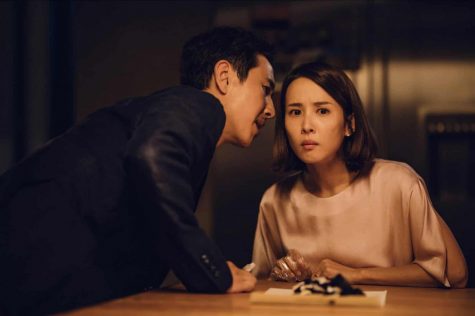‘Parasite’ takes drama, thriller genre to next level
February 6, 2020

What begins as a largely fun and light-hearted tale of casual deception and trickery escalates, plot twist after plot twist, into a full-blown monster of a thriller in South Korean director Bong Joon-ho’s latest masterpiece, “Parasite,” which is nominated for six Academy Awards, including Best Picture.
The movie opens with the Kim family folding pizza boxes in their semi-basement apartment for cash, and nearly suffocating when they decide to let outside fumigation into their pest-ridden home. Their life is anything but easy, but their luck seems to turn when a friend’s recommendation lands son Ki-woo (Choi Woo-shik) a job tutoring for the daughter of the wealthy Park family.
Despite not having a college degree, Ki-woo decides to forge his way into the job, thus throwing himself and his family into an increasingly precarious spiral of lies. One by one, the almost ‘parasitic’ Kims infiltrate the house and lives of the their host family, the Parks — but they’re in for a surprise when this doesn’t go as smoothly as planned.
The movie does not fit into any one genre, but seamlessly ties together several, from thriller, to comedy, to drama and mystery. Dark humor at the beginning of the film slowly builds into suspense, and ultimately outright horror. Meanwhile, the tension in “Parasite” is almost impossible to stand. Every moment that makes the audience ask “What could go wrong?” goes wrong, in the most unexpected way.
From what we’ve seen from other movies depicting class struggle and inequality, we should be rooting for the underdogs, the family who struggles financially, while reveling in the downfall of the wealthy family who has no idea the extent of their privilege. But in Bong’s film, the rich family is hard to hate and the poor family is hard to love. There is no outright villain — we empathize with each and every character and the unique struggles they face.
What’s more, every second of Bong’s composition is aesthetically gorgeous. Each shot, from the wide, serene views of the Parks’ perfectly manicured garden, to the Kims’ descent into the basement through the low-roofed, green-tinted cement tunnels, to the stormy chase scenes that follow the Kims through narrow alleys amid booming thunder and pouring rain, all serve to enhance the drama of the story and fully immerse the viewer in the narrative.
“Parasite” takes place in two main settings, and the audience is constantly tossed between the wealthy multi-story home of the Parks and the filthy semi-basement apartment of the Kims. This juxtaposition amplifies the contrast between the two worlds, and even more, how out of touch they are with each other. It brings to light the reality that despite all their attempts at upward social mobility, the Kims seem to be relegated forever to the literal bottom of society, while frustratingly, the Parks seem to remain forever at the top.
Movies out of Hollywood often leave audiences with a satisfying, albeit unrealistic, ‘happily ever after’ ending. In all honesty, “Parasite” didn’t provide the fairytale resolution we were craving after all the drama was said and done, and left us with lingering questions. Nonetheless, this choice was ultimately a much more authentic depiction of life than the Hollywood conclusions audiences are accustomed to, and adds to the despondence of the stirring real-life portrait that is “Parasite.”
Bong’s film has already made history by being the first Korean film to earn an Oscar nomination for Best Picture and Best Director, among other awards. It marks a huge step for Asian popular culture to take center stage at a routinely American-dominated award ceremony.
Critics and admirers alike seem to think it unlikely that a foreign-language film could win a major award at the Oscars, and to do so would be to set an unforgettable precedent — no foreign-language film has ever been awarded “Best Picture.” However, having Korean as its primary language didn’t prevent “Parasite” from winning the prestigious Palme d’Or at the Cannes Film Festival or a Golden Globe for Foreign Language Film. If any non-English film could be the one to win Best Picture, “Parasite” is the one.
Moreover, the subtitles did not undermine our enjoyment of the film—on the contrary, we found that the language formed an essential part of the setting and contributed to creating its unique ambiance. Once a few minutes had gone by, we were so engrossed in the scene before us that the subtitles were less something that we had to consciously focus on, rather, merely part of the scene.
We hope that the quality of the film is ultimately the criteria used to determine the winner of Best Picture at the Oscars, and that the complex and gripping story told by “Parasite” won’t be subverted by an English-speaking audience’s unwillingness to see and enjoy a foreign-language film with subtitles.
As director Joon-ho said when accepting the award for Best Foreign-Language Film at the Golden Globes, “Once you overcome the one-inch tall barrier of subtitles, you will be introduced to so many more amazing films.”
“Parasite”
2 hours, 12 minutes
Rated R (for language, some violence and sexual content)
Directed by Bong Joon-ho
Starring Cho Yeo-jeong, Choi Woo-shik, Kang-Ho Song, Jang Hye-jin










